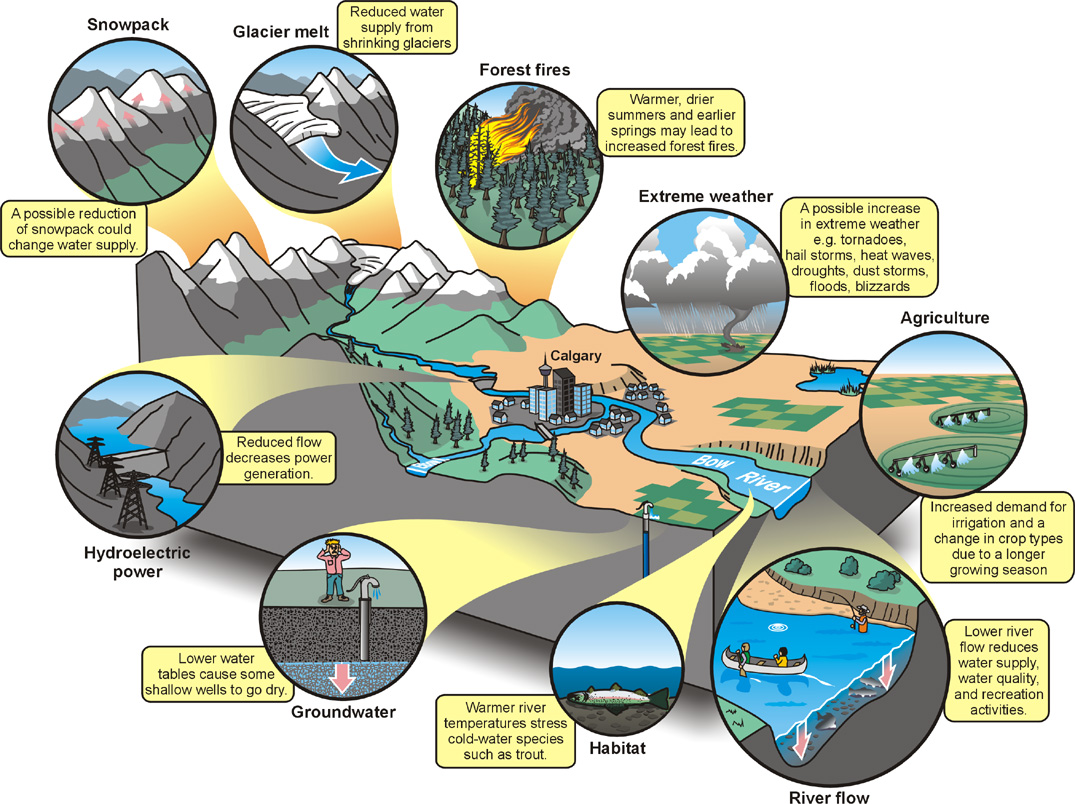
Climate change is the change in climate patterns as a
result of increased temperatures. These changes can be caused by increased
greenhouse gases in the atmosphere as a result of the use of more burning of
fossil-fuels, deforestation, etc. Greenhouse gases soak up the suns heat
thereby ensuring the temperature of the earth remains at a stable level to
support all living organisms; but as more gas is released it traps more heat
causing temperatures to rise, which affect precipitation, length of seasons,
sea level, etc. Scientists believe that our dependence on fossil fuels like coal for energy production, oil which is
used to make gasoline, diesel fuel, electricity, to power industry, dates back
to the industrial era. They believe this
fuel produces harmful gases like carbon-dioxide which is released into the air,
and as it’s burned plays a part in today’s energy crisis and since we use oil
either in gasoline for our cars or for heat and electricity we’re consuming
large amounts of fossil fuels which is then released into the air in large
amounts leading to the change in temperatures.

When it comes to the issue of climate
change, scientists, government officials and even the people are divided as to
its cause and possible solutions.
Proponents of global warming believes that the greenhouse gas that’s
being released into the atmosphere through burning fossil fuels has contributed
to the rise in our temperatures which has led to warmer winters, hotter
summers, rising sea levels, melting of our arctic, as well as increased
hurricanes, etc. the article President
Obama’s Climate Action Plan’ tells us that: “Last year alone, there were
eleven different weather and climate disaster events with estimated losses
exceeding one billion dollars each across the United States”. Not only is
climate change an environmental problem it also has economic consequences as
well. Those who oppose argue that “carbon-dioxide is not a pollutant, it
results in more plant growth and less water required for plants to grow
stronger and it results in a greener earth and that life cannot exist without
CO2” (The truth about Global warming: science and distortion –Stephen
Schneider). Opponents believe that the warming we are experiencing is a natural
phenomenon.
 Conservatives
as well as some scientists challenge the exact cause of climate change. They
argue that it’s not all man and instead blame it on changes in our atmosphere,
in the sun, our ocean and the clouds, but what about the impact of overpopulation. Doesn't this also contribute to the energy crisis? As our population continues
to grow, it may soon reach proportions where our resources will not be able to
sustain life as its known today. Overpopulation can lead to climate change due
to the increase in greenhouse gases, this can create flooding, heat waves,
droughts, and storms affecting food production in some regions that would be
unable to grow food staples, fishes will migrate or their stock diminished. Environmental,
economic and social factors are all impacted by overpopulation and in many
parts of the world there are not enough available resources to feed their
growing populations. Population growth can lead to resource depletion,
environmental deterioration, fishery depletion, heath issues, soil and water
contamination, poverty, etc, thereby creating an increased burden on our
limited natural resources.
Conservatives
as well as some scientists challenge the exact cause of climate change. They
argue that it’s not all man and instead blame it on changes in our atmosphere,
in the sun, our ocean and the clouds, but what about the impact of overpopulation. Doesn't this also contribute to the energy crisis? As our population continues
to grow, it may soon reach proportions where our resources will not be able to
sustain life as its known today. Overpopulation can lead to climate change due
to the increase in greenhouse gases, this can create flooding, heat waves,
droughts, and storms affecting food production in some regions that would be
unable to grow food staples, fishes will migrate or their stock diminished. Environmental,
economic and social factors are all impacted by overpopulation and in many
parts of the world there are not enough available resources to feed their
growing populations. Population growth can lead to resource depletion,
environmental deterioration, fishery depletion, heath issues, soil and water
contamination, poverty, etc, thereby creating an increased burden on our
limited natural resources.

Overpopulation
creates the need for more space thereby putting pressure on the need to use our
limited resources; more and more forests will be cut down to create homes,
jobs, etc thereby displacing many animals from their habitat causing these
species to become endangered, and more
animals and fishery will be killed for food. Population growth would create a
demand on our water supply. Fresh water which is already scarce in some parts
of the world will become an issue creating more and more shortages before it
disappears forever. Overpopulation can also lead to climate change due to the
increase in greenhouse gases, this can create flooding, heat waves, droughts,
and storms affecting food production in some regions that would be unable to
grow food staples, fishes will migrate or their stock diminished. Environmental
growth can lead to water and soil pollution. As the demand for more food grows,
farmers may start cultivating and growing foods in lands that are poor in
nutrients leading to soil degradation and as more trash is thrown away, this
leads to more waste in our landfills creating soil pollution.
 Many conservatives
claim that shifting over to renewable energy would actually “cost more money
for the US and consumers”. They argue that the cost associated with going
green is too expensive, that it would slow down production, and even though
business would be able to save on energy and production costs in the future,
they’re not willing to make that investment. These conservatives care more
about big business and the bottom line than the energy crisis we’re currently
facing. Schneider tells us that: “People frame this problem by looking for
exceptions to the conventional wisdom and claim, until the exceptions are
resolved, it isn't proof and it’s premature to act”. Conservatives know that we
have an energy problem, yet believe global warming is not a crisis, and that by
switching to green energy would not only slow down our production but our
economy as well. They believe more jobs can be created by increasing oil and
gas production by opening more oil drills, gas refineries, pipelines, etc.
They’re not concerned about the long term effect this can have on the
environment. .
Many conservatives
claim that shifting over to renewable energy would actually “cost more money
for the US and consumers”. They argue that the cost associated with going
green is too expensive, that it would slow down production, and even though
business would be able to save on energy and production costs in the future,
they’re not willing to make that investment. These conservatives care more
about big business and the bottom line than the energy crisis we’re currently
facing. Schneider tells us that: “People frame this problem by looking for
exceptions to the conventional wisdom and claim, until the exceptions are
resolved, it isn't proof and it’s premature to act”. Conservatives know that we
have an energy problem, yet believe global warming is not a crisis, and that by
switching to green energy would not only slow down our production but our
economy as well. They believe more jobs can be created by increasing oil and
gas production by opening more oil drills, gas refineries, pipelines, etc.
They’re not concerned about the long term effect this can have on the
environment. .
 Democrats believe that
although we can’t reverse the effects of global warming, we can take steps to
protect the environment for future generations. They believe investing in green
energy like solar, wind, tidal, and hydro can slow the effects of global
warming and are even offering programs aimed at giving citizens tax breaks when
they buy energy products. In 2009, President Obama pledged that by 2020
“America would reduce its greenhouse emission in the range of seventeen percent
below 2005 levels” (President Obama’s Climate Action Plan”). They believe by
cutting down on the use of fossil fuels can lead to new innovations which can
help modernize power plants, create jobs and reduce our dependency on foreign
oil. This clean energy will reduce the amount of energy consumed by families
resulting in lower gas and energy bills, and also more fuel efficient cars.
Democrats believe that
although we can’t reverse the effects of global warming, we can take steps to
protect the environment for future generations. They believe investing in green
energy like solar, wind, tidal, and hydro can slow the effects of global
warming and are even offering programs aimed at giving citizens tax breaks when
they buy energy products. In 2009, President Obama pledged that by 2020
“America would reduce its greenhouse emission in the range of seventeen percent
below 2005 levels” (President Obama’s Climate Action Plan”). They believe by
cutting down on the use of fossil fuels can lead to new innovations which can
help modernize power plants, create jobs and reduce our dependency on foreign
oil. This clean energy will reduce the amount of energy consumed by families
resulting in lower gas and energy bills, and also more fuel efficient cars.
 In
order to decrease the current climate crisis we need to stop or reduce our
fossil fuel consumption. Today, only “8% of US energy
consumption is from renewable energy” while we consume “37% from oil and 21%
coal” proving more change is needed. we can start by using alternative energy like, solar, water
and wind energy, driving fuel efficient cars, carpooling, reducing our
dependency on fossil fuel, use energy saving appliances, recycling, organic
farming, planting trees, using reusable bags, etc.; we also need to stop deforestation since the
cutting and burning down of our trees is causing more CO2 to enter the atmosphere.
If change is to occur governments has to invest
more in these life and earth changing efforts because it’s not just our plants
and animals who will suffer but us humans as well.
In
order to decrease the current climate crisis we need to stop or reduce our
fossil fuel consumption. Today, only “8% of US energy
consumption is from renewable energy” while we consume “37% from oil and 21%
coal” proving more change is needed. we can start by using alternative energy like, solar, water
and wind energy, driving fuel efficient cars, carpooling, reducing our
dependency on fossil fuel, use energy saving appliances, recycling, organic
farming, planting trees, using reusable bags, etc.; we also need to stop deforestation since the
cutting and burning down of our trees is causing more CO2 to enter the atmosphere.
If change is to occur governments has to invest
more in these life and earth changing efforts because it’s not just our plants
and animals who will suffer but us humans as well.

The US can
strengthen the economy and preserve the environment by investing in alternative
energy like tidal turbines which can be built into the ocean and can be used to
harness ocean currents, wind power which can be used to produce electricity,
pump water, etc., since wind energy is produced by wind it’s clean energy and
does not pollute the air like fossil fuels, the downside is it can endanger
birds which can be killed if they fly into the rotors, we can use geothermal
energy to harvest the earth’s energy to generate electricity, and solar energy
captured using solar panels captures the sun’s rays and converts and
distributes it as power, we can use it to heat water, the home, lightening, for
cooking, electricity, etc. Solar energy does not harm our environment and since
the sun’s energy is free and constant, we don’t have to worry about it running
out which makes it very dependable. We also need to increase our fuel
efficiency standards, this can “reduce greenhouse gas emissions by
approximately 270 million metric tons and save 530 million barrels of oil”
(Obama’s Climate Action Plan, pg 8). This can help save drivers hundreds of
dollars in fuel costs.
 We need to invest in and support renewable energy projects
like Cape Wind, a proposal to house an offshore wind
farm off the coast of the Cape in Nantucket Sound and would house close to a
hundred and thirty wind turbines. These turbines will harness the winds energy
and provide clean, renewable energy which would significantly cut down on tons
of carbon-dioxide emissions and other green house gasses”.
Supporters the project believes that it would create jobs
which would help boost the economy and would help ignite the offshore wind
industry. It would also create cleaner air by reducing greenhouse gas emissions
thereby reducing global warming effects on the environment and the project will be able to
provide about seventy-five percent of the Cape and surrounding island power
every year. Opponents argue that the turbines would threaten air and sea travels,
commercial fishing, endanger birds and other marine animals in the Sound.
They’re also afraid that it would impose a hike in their electrical rate, and
that it would affect he resale value of their property and could pollute their beaches.
As humans we’re the ones responsible for the destabilization of our ecosystem,
so we should be the ones to fix it. I believe most
people take the approach of if I can’t see it then it doesn't affect me
approach, but simple steps as installing energy efficient appliances or turning
off lights in our homes can make a difference. Solar energy is clean,
dependable energy which can be used in a number of ways from heating the home
to providing electricity for cooking and the tax breaks that are being offered is
great incentive for homeowner who want to improve that home’s energy efficiency.
We need to invest in and support renewable energy projects
like Cape Wind, a proposal to house an offshore wind
farm off the coast of the Cape in Nantucket Sound and would house close to a
hundred and thirty wind turbines. These turbines will harness the winds energy
and provide clean, renewable energy which would significantly cut down on tons
of carbon-dioxide emissions and other green house gasses”.
Supporters the project believes that it would create jobs
which would help boost the economy and would help ignite the offshore wind
industry. It would also create cleaner air by reducing greenhouse gas emissions
thereby reducing global warming effects on the environment and the project will be able to
provide about seventy-five percent of the Cape and surrounding island power
every year. Opponents argue that the turbines would threaten air and sea travels,
commercial fishing, endanger birds and other marine animals in the Sound.
They’re also afraid that it would impose a hike in their electrical rate, and
that it would affect he resale value of their property and could pollute their beaches.
As humans we’re the ones responsible for the destabilization of our ecosystem,
so we should be the ones to fix it. I believe most
people take the approach of if I can’t see it then it doesn't affect me
approach, but simple steps as installing energy efficient appliances or turning
off lights in our homes can make a difference. Solar energy is clean,
dependable energy which can be used in a number of ways from heating the home
to providing electricity for cooking and the tax breaks that are being offered is
great incentive for homeowner who want to improve that home’s energy efficiency.
Facts:
- Last year alone, there were eleven different weather and
climate disaster events with estimated losses exceeding one billion dollars
each across the United States”.President Obama’s Climate Action Plan <http://www.nytimes.com/interactive/2013/06/25/us/obama-climate-action-plan.html?ref=globalwarming&_r=1&>.
- “Carbon-dioxide is not a pollutant, it results in more plant
growth and less water required for plants to grow stronger and it results in a
greener earth and that life cannot exist without CO2” (The truth about Global
warming: science and distortion –Stephen Schneider)
- "People
frame this problem by looking for exceptions to the conventional wisdom and
claim, until the exceptions are resolved, it isn't proof and it’s premature to
act” (Schneider)
- “America
would reduce its greenhouse emission in the range of seventeen percent below
2005 levels” (President Obama’s Climate Action Plan”).
- "8% of US energy consumption is from renewable
energy” while we consume “37% from oil and 21% coal”
- "reduce greenhouse gas emissions by approximately 270 million metric tons and
save 530 million barrels of oil” (Obama’s Climate Action Plan)

Works Cited:
“Cape Wind”. 27 Oct 2012.
boem.gov. Bureau of Ocean Energy Management.
“Cape
Wind Project – The main pros and cons”. globalwarming360.net. 27 Oct 2012.
<www.globalwarming360.net/cape-wind-project-the-main-pros-and-cons.html>.
“President Obama’s Climate Action Plan”. NewYorkTimes.com.
25 June 2013. 26 Oct 2013.
 I've learnt to identify the different political viewpoints in reporting which allows
me to look at the news in a more objective manner by separating the liberal and
conservative viewpoints and concentration on the issue, because of this I've come to realize that although the media can be used as a tool to educate the
public it can also be very biased in its reporting. It’s changed my views of
journalists, it’s made me realized that I have to start looking at them as
people who are not always able to leave their opinions out of their articles
and it’s up to me to filter out the facts from their opinions
I've learnt to identify the different political viewpoints in reporting which allows
me to look at the news in a more objective manner by separating the liberal and
conservative viewpoints and concentration on the issue, because of this I've come to realize that although the media can be used as a tool to educate the
public it can also be very biased in its reporting. It’s changed my views of
journalists, it’s made me realized that I have to start looking at them as
people who are not always able to leave their opinions out of their articles
and it’s up to me to filter out the facts from their opinions There isn't anything necessarily
about this course that I would change, except maybe setting a time for each person to post his/her initial post on the discussion board. This would make
responding to posts easier instead of having to check the discussion board
daily only to have to wait until Sunday night to respond and even then you have
to keep your fingers crossed when you log on that two other people posted so
you can post your response.
There isn't anything necessarily
about this course that I would change, except maybe setting a time for each person to post his/her initial post on the discussion board. This would make
responding to posts easier instead of having to check the discussion board
daily only to have to wait until Sunday night to respond and even then you have
to keep your fingers crossed when you log on that two other people posted so
you can post your response.







































